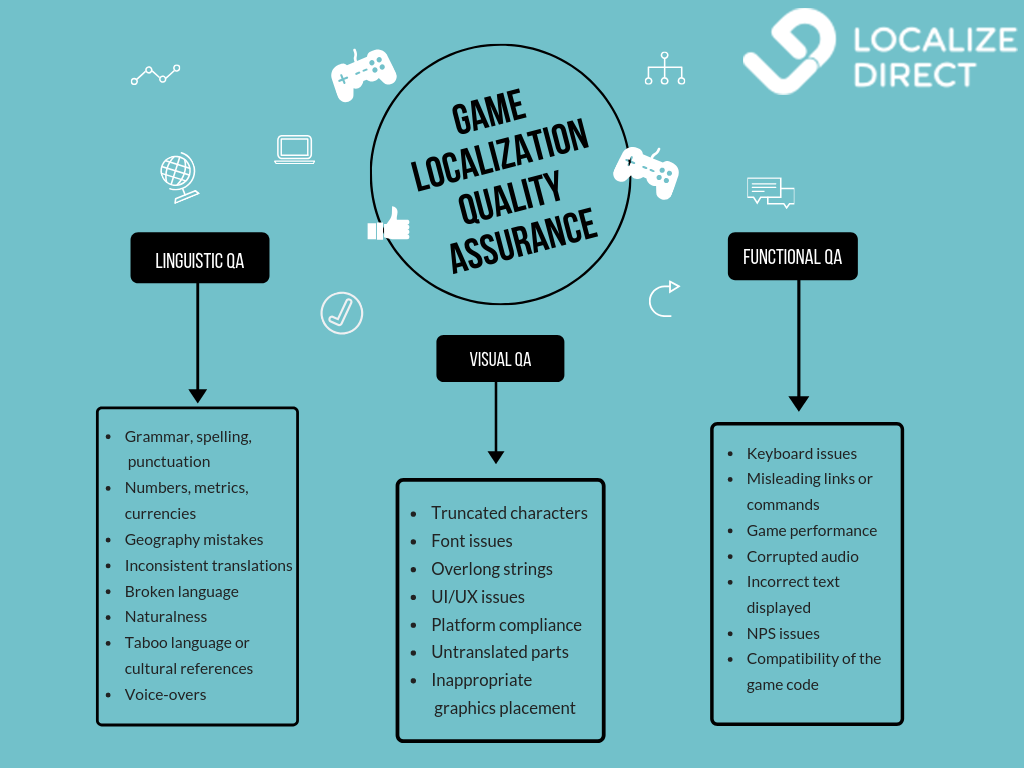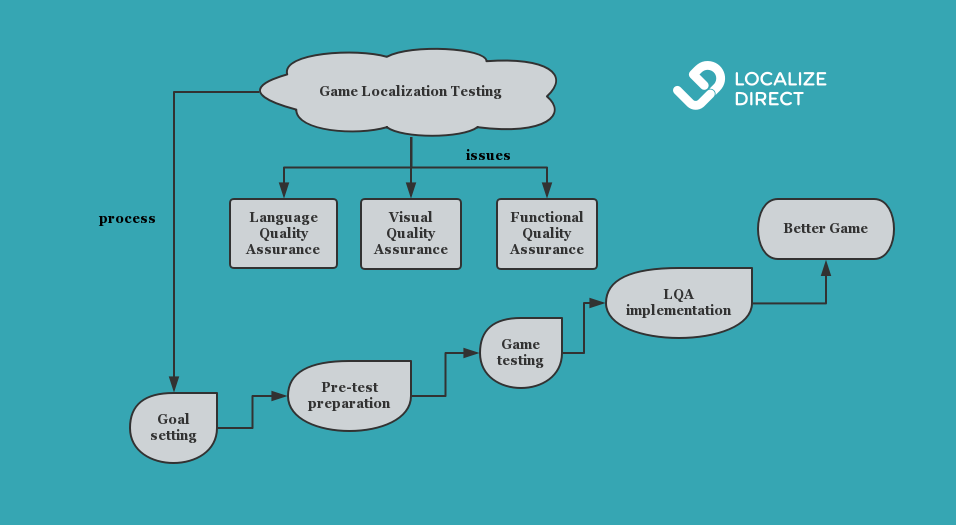Trending
Opinion: How will Project 2025 impact game developers?
The Heritage Foundation's manifesto for the possible next administration could do great harm to many, including large portions of the game development community.
How can you trust that your translated game is as cool as the original and the gamers enjoy it as if created in their own language - perhaps with all those witty puns and creative jokes? Here’s where LQA comes into play.

LocalizeDirect blog.>To learn about Game Localization Testing, we must first establish what is LQA:
Localization Quality Assurance (LQA) is the last stage in the game localization process. Primarily, it focuses on linguistic testing and translation quality review but also covers UI/UX evaluation, compliance testing, culturalization, internationalization, functional tests and more.
In short, native speaking linguists with expertise in gaming and local culture play and review your game, making sure that there are no errors or problems - both linguistically and visually.
If the game is about to be published in multiple languages, every version should be tested by the appropriate native professional.
Note: It’s especially important for languages that have two and more variations - European and Brazilian Portuguese, European and Canadian French, European and Latin American Spanish which can differ in Mexico, Argentina and Peru.
For instance, a general Spanish linguist can test the game for the South American market from the perspectives of grammar and punctuation. But he may not be able to play around with local jokes, celebrities, and specific cultural references.
LQA confirms that the game is localized to all the desired languages, all strings are translated, the terminology meets the hardware manufacturers requirements, and no implementation issues are found. Plus, it makes sure that the translations are done with a natural flow and consistency.

Now, let’s dig deeper into the most common issues LQA testers hunt for. We’ll start with linguistic QA testing (language QA).
Linguistic game testing targets mistakes in game scripts and voice-overs. Typically, those are spelling, grammar errors, and mistranslations. In the end, the linguistic QA testers suggest how to fix them or provide alternative translations.
The typical language-related bugs in localized games are:
Grammar, spelling, and punctuation mistakes (verb conjugation, missing words or punctuation signs, repeated words, and phrases, etc.);
Issues with numeric formats, financial symbols, calendars, dates (DD/MM/YYYY in the UK vs MM/DD/YYY in the USA vs YYYY/MM/DD in Korea, China, Iran);
Incorrect metric and currency conversions, measurement units (miles vs kilometers, pounds vs kilograms in the US/UK vs continental Europe);
Country-related errors (irrelevant zip codes, phone numbers, addresses, names);
Broken language-specific characters (e.g., inappropriately displayed diacritics in Polish, Hebrew, Arabic);
Contextual inaccuracy, when words or sentences aren’t translated according to the actual context or literal translation of idioms;
The natural flow of language - do the phrases sound like one would expect in day-to-day speech?
Partial or inconsistent translations (one word is translated differently throughout the game, especially when it comes to the synonyms like “submit”, “send”, “apply”);
Voice-over issues (the voice-over files are translated incorrectly or subtitles and audio are displayed at different times);
Sensitive cultural references (cultural taboos, phrases or language that is considered offensive, etc.).
Example: “Fatal Fury Special” was full of funny phrases, mainly because of the literal translation from Japanese. Like this one: “Your fists of evil are about to meet my steel wall of niceness.”

Visual QA testing checks for any design-related issues, among them:
Truncated characters. For instance, UTF characters not recognized and replaced by question marks � or full blocks.
Font issues. The font is too big to fit the screen/section or too small to be read by the users.
Untranslated or partially translated content and graphics.
Overlong strings. A common problem for translations into German or Spanish as they are approximately 30% longer than English.
Compliance check - does the game look the way it should across PC, Android, iOS?
UI/UX issues. The text is cut off from buttons or assigned space. Perhaps alternate wording is needed, or perhaps a smaller font. In some cases, a larger button or other element containing text is a solution.
Inappropriate placement of the visuals.
Functionality QA testing (FQA) targets any art, graphic or engineering bugs to be fixed with a code change. For instance, if the game was not localization-friendly from the very beginning or does not use Unicode, the bugs related to how the special characters are displayed will be frequent.
Other most common issues include:
International keyboards - input problems, some keyboard commands do not work as expected.
Links. Does the text on the buttons correspond with their functions? Is the user sent to the intended page?
Compatibility. Do all the localized versions work with each other and the original version? Is the game code localization-friendly?
Performance. Game crashes or freezes all of a sudden.
Graphic. Missing textures, incorrect or non-existent collision and players can walk through walls or meet invisible obstacles, issues with the camera (the wrong angle, frozen camera, etc.)
AI behavior. Non-player characters (NPC) misbehaving.
Audio. The audio file is corrupted, played at an incorrect time, stops in the middle of the sentence, the wrong file is played, subtitles are displayed on a different time, etc.
Text. An incorrect message is displayed, fonts are missing or corrupted, the text is overlapping with another piece or picture, irrelevant or insufficient instructions are given to the user, incorrect terminology.
Good to know: This classification is pretty general, and often LQA testers are looking for all the issues in one batch of testing (especially critical bugs that prevent them from accessing the localized assets in the game).
Localize Direct's Localization Testing Program can be taken as a good general go-to list for LQA process:
Goal setting. The LQA manager determines your needs and prepares the schedule and a test plan.
Pre-test preparation. Game testers receive the localization brief about the game genre, previous versions (if they test updates), localization kit, style guides, how many hours or levels they are expected to play, and how many times to pass a level, and any other relevant info shared in the previous stage.
Game testing. LQA specialists play the video game, assess linguistic quality, and document the bugs and inconsistencies in the spreadsheet. They provide screenshots, explanation of what they show, and suggestions on how to improve the game. With the wrong translation, the correct version will be suggested.
LQA implementation. After you receive the reviewed files, the loc manager helps you implement updates.

When the linguistic QA specialists test the game in a few languages, they often do a “crosscheck” - to find out whether the bug is repeated in other versions.
Bear in mind: Some bugs may not be reproducible and could reappear even after the LQA has been conducted.
Despite the popular belief that LQA testers are gamers that test the game simply by playing it over and over, they do in fact have specific tasks given by the clients to minimize the amount of work. The developers/owners of the game decide themselves how many levels gamers should check, and how many rounds to pass.
The LQA plan is customized for every title and depends on the number of language assets the game has, its game size, and which languages are to be tested.
Thanks to this customization, a comprehensive LQA process allows for a more accurate evaluation of the effort needed, often saving costs and unnecessary extra rounds of testing.
Consider using LQA if:
You developed a game but don’t have an in-house QA team to run a functional check. The LQA testers can also help identify any functional errors as that’s part of the localization testing. It’s a money-saver, too!
You translated your game or app with an external team, community, or source, but would like to get an extra opinion on the quality of the translation and to have expert feedback on its present state.
Your game or app is translated into the languages with completely different semantic and alphabets as it leads to a higher number of errors. These are English-Chinese, English-Bulgarian, English-Korean, English-Arabic language pairs, and so on.
You need to publish your game asap. LQA is more time-efficient compared to functional and linguistic QA as two independent processes.
Why not proofreading? Proofreading is not enough as it won’t show whether the localized text is displayed properly in the game. Reviewing in context, also grants the unique capacity to decide what is the best translation possible.
Simply: to save costs, avoid negative reviews, and have happy gamers. Finding and fixing bugs before the game publishing is always better than urgently fixing them live.
Especially, if you invested years in developing one game, like Star Trek (2013) that was released a month before the “Star Trek Into Darkness” film. The creators spent three years on its development but the game did not perform well. This was regularly attributed to the numerous bugs and glitches found. In three weeks, it sold only 140,000 copies and amassed a pile of bad reviews.

Of course, there are hilarious awesome mistranslations like “All your base are belong to us” or “Welcome to die!” that went viral, entertaining gamers for decades and becoming an inspiration for many remixes, memes, and jokes. And we love them, too! But would you really like having your games remembered because of that?
Read more about:
BlogsYou May Also Like